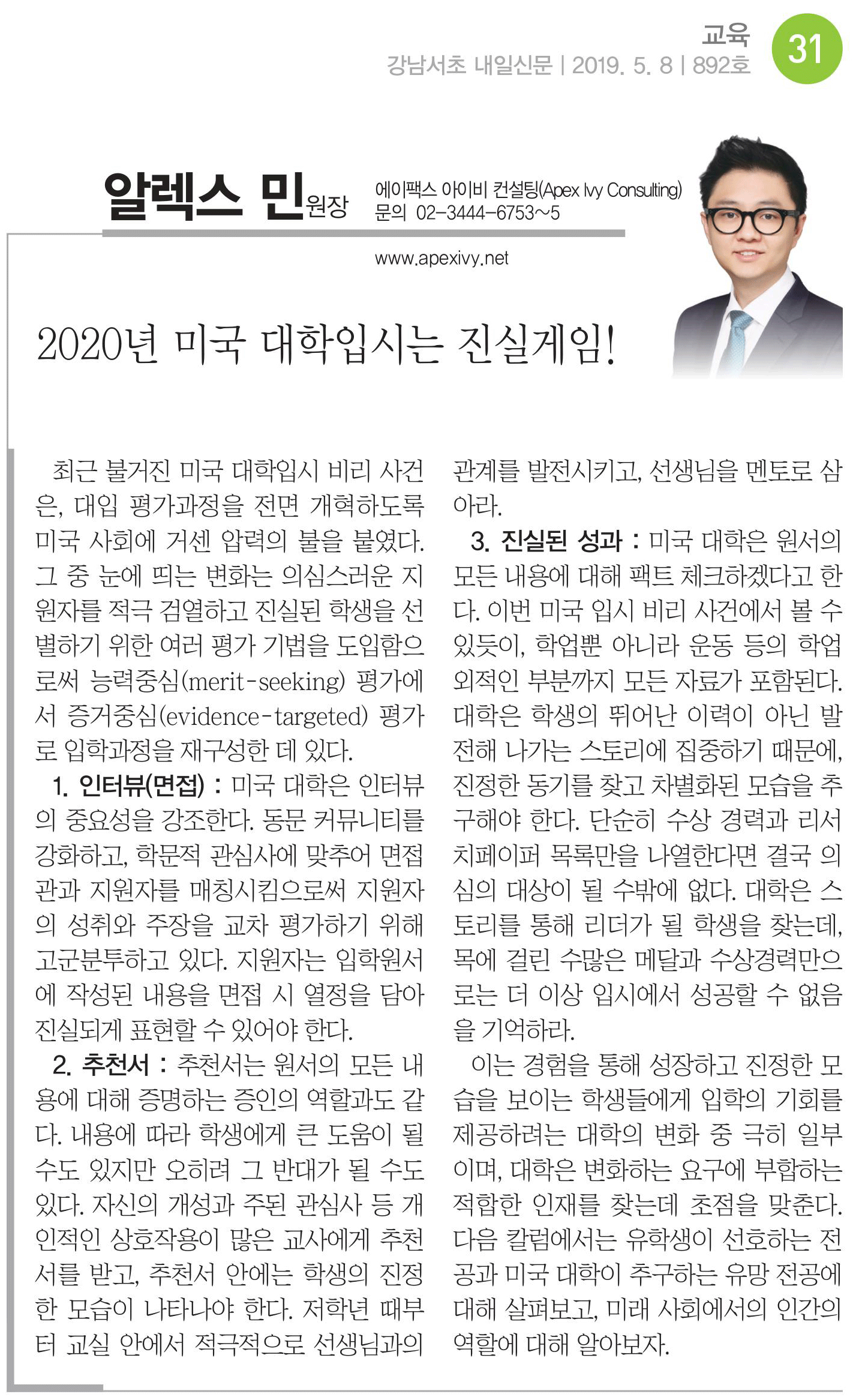
[미국대학 입시] 2020년 미국 대학 입시는 진실게임!
Apex Ivy 대표 Alex Min
최근 불거진 미국대학 입시 비리 사건은, 대입 평가 과정을 전면 개혁하도록 미국 사회에 거센 압력의 불을 붙였다. 그 중 눈에 띄는 변화는 의심스러운 지원자를 적극 검열하고 진실된 학생을 선별하기 위한 여러 평가 기법을 도입함으로써 능력중심(merit-seeking) 평가에서 증거중심(evidence-targeted) 평가로 입학과정을 재구성한 데 있다.
1. 인터뷰(면접)
미국 대학은 인터뷰의 중요성을 강조한다. 동문 커뮤니티를 강화하고, 학문적 관심사에 맞추어 면접관과 지원자를 매칭시킴으로써 지원자의 성취와 주장을 교차 평가하기 위해 고군분투하고 있다. 지원자는 입학원서에 작성된 내용을 면접 시 열정을 담아 진실되게 표현할 수 있어야 한다.
2. 추천서
추천서는 원서의 모든 내용에 대해 증명하는 증인의 역할과도 같다. 내용에 따라 학생에게 큰 도움이 될 수도 있지만 오히려 그 반대가 될 수도 있다. 자신의 개성과 주된 관심사 등 개인적인 상호 작용이 많은 교사에게 추천서를 받고, 추천서 안에는 학생의 진정한 모습이 나타나야 한다. 저학년 때부터 교실 안에서 적극적으로 선생님과의 관계를 발전시키고, 선생님을 멘토로 삼아라.
3. 진실된 성과
미국 대학은 원서의 모든 내용에 대해 허위 사실 여부를 팩트 체크하겠다고 한다. 이번 미국 입시 비리 사건에서 볼 수 있듯이, 이는 학업뿐 아니라 운동 등의 학업 외적인 부분까지, 학생을 빛내기 위해 만들었던 모든 자료가 포함된다. 대학은 학생의 뛰어난 이력이 아닌 발전해 나가는 스토리에 집중하기 때문에, 진정한 동기를 찾고 차별화를 이루어가는 모습을 추구해야 한다. 단순히 수상 경력과 리서치페이퍼 목록만을 나열한다면 결국 의심의 대상이 될 수밖에 없다. 대학은 스토리를 통해 리더가 될 학생을 찾는데, 이러한 변화 속에서 목에 걸린 수많은 메달과 수상경력만으로는 더 이상 입시에서 성공할 수 없음을 기억하라.
이는 경험을 통해 성장하고 진정한 모습을 보이는 학생들에게 입학의 기회를 제공하려는 대학의 변화 중 극히 일부에 불과하다. 또한 대학은 변화하는 요구에 부합하는 적합한 인재를 찾는데 초점을 맞춘다. 다음 칼럼에서는 한국을 비롯한 유학생들이 선호하는 전공과 미국 대학이 추구하는 유망 전공에 대해 살펴보고, 자동화 및 인공지능을 통해 상상할 수 없는 변화가 나타날 미래 사회에서의 인간의 역할에 대해 알아보자.
알렉스 민(Alex Min) 원장
에이팩스 아이비 컨설팅(Apex Ivy Consulting)
문의 02-3444-6753~5
www.apexivy.net
<영문 버전>
The recent US college admissions fraud involving Yale and Stanford ignited mounting pressure from American society for colleges to restructure their application evaluation process. Massive changes will reconfigure admissions from merit-seeking to evidence-targeted processes by employing a number of evaluative techniques to identify truthful applicants while flagging suspicious applicants. Some changes will be:
- Interview. Alumni interviewers will play an increased role in helping colleges understand the student, in-person. Top US colleges are doubling down on their efforts to build alumni communities that are more involved with admissions, and will also strive to match applicants to interviewers with similar academic interests to achieve increased accuracy in cross-evaluating the achievements and claims made by applicants. So if you write about it in the application, you better be able to talk about it, sincerely, intellectually and emotionally.
- Teacher recommendations. Self selected by applicants to represent their everyday status as students to revealing key information bits on character assets and core interests, teacher recommenders can make or break your future. So make sure that the assets you are championing in your applications are complemented by your recommendation writers through the recounts of their personal interactions with you. If you are not yet a senior, work on developing relationships beyond the classroom teacher-student setting to connect with your teachers, deeply, personally and with focus. Basically, make your teachers your mentors.
- Real achievements with provable social impact, not fake papers and false documents. Singer’s admission fraud involved constructing false data to make students shine, whether athletically or academically. Colleges will become more interested in understanding your development story than milestones, so find sincere motives and pursue self defining experiences that shaped your differentiation. Just heatedly stringing together a list of awards and research papers will raise suspicion from admission officers. At the end of the day, colleges are looking for students they can mold into leaders, and while more medals don’t make a student more impressionable, one’s development history or lack thereof provides strong indicators.
These are but some of the many factors that will change to open admissions to those who provide real, provable experiences. Next week, we will discuss top majors, as applied by Korean applicants versus real US university demands, and some actionable tips that will help you to begin thinking not only about admissions but your role in a world that is set for unthinkable changes as we run deeper into automation, artificial intelligence and super connectivity – or 4th Industrial Revolution. Colleges have changed their focus to look for students with the right type of assets and interests that would best serve the goals set by the world’s changing demands.
Alex Min